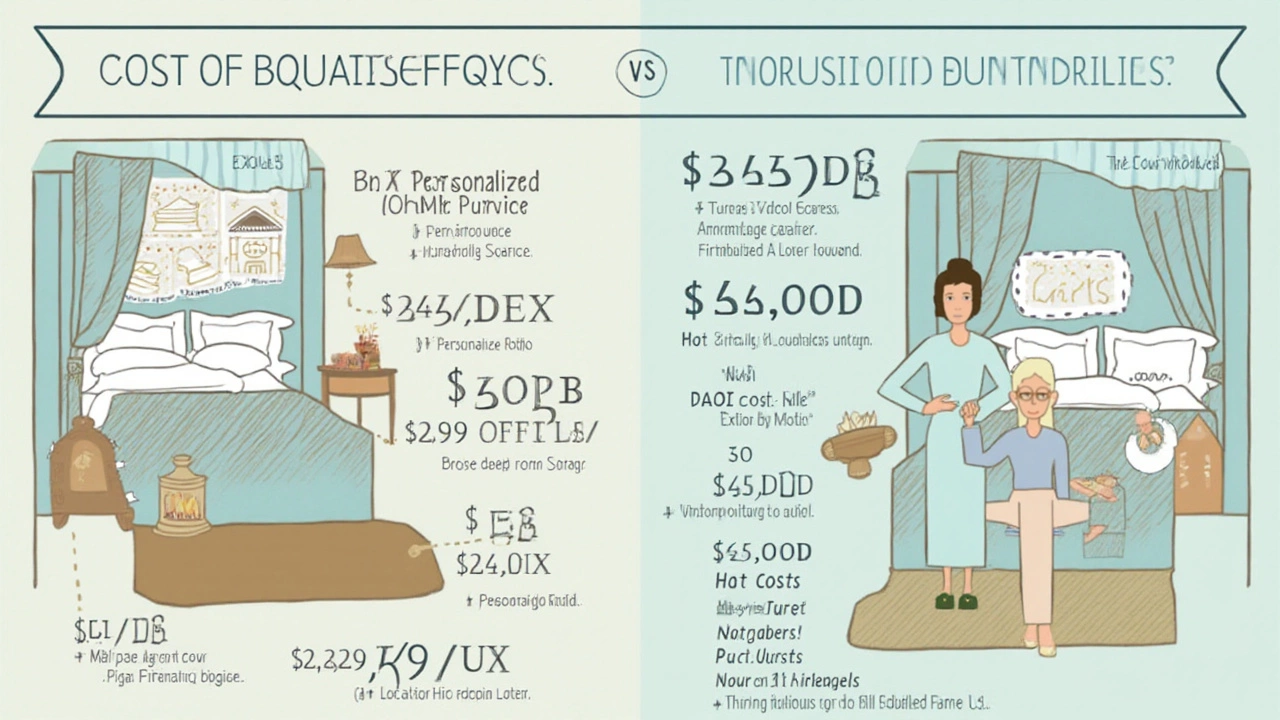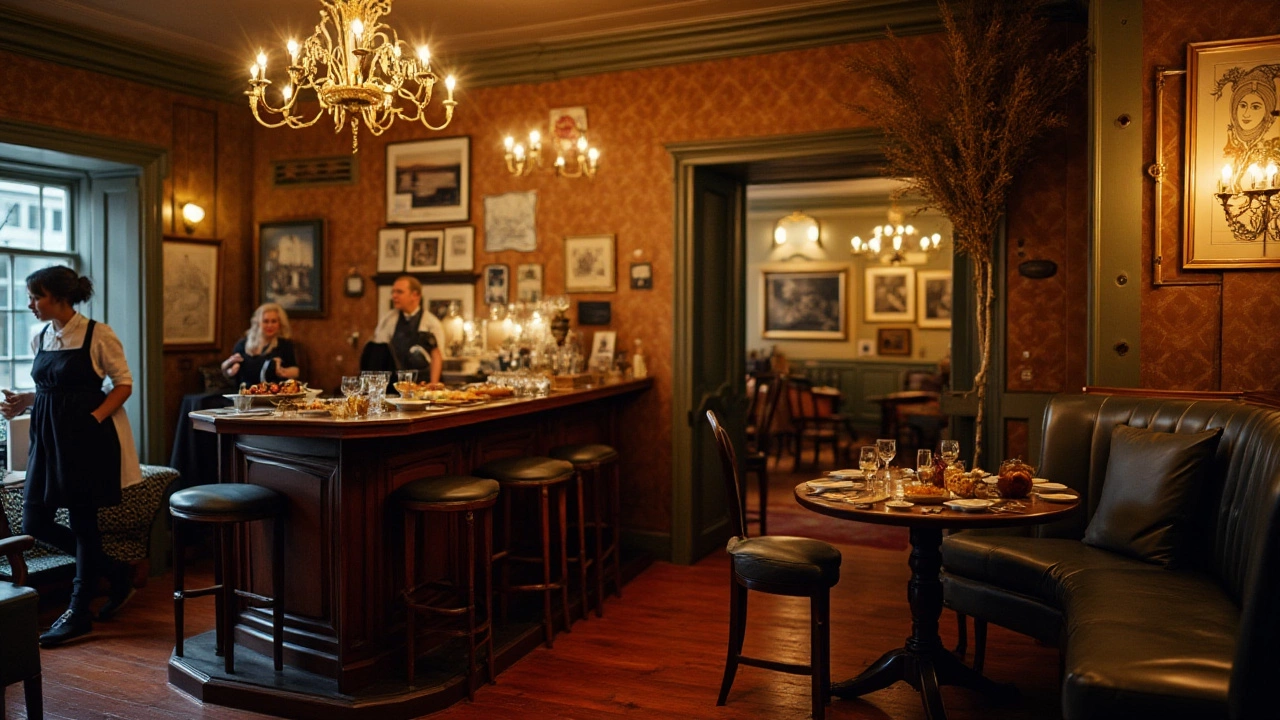Boutique hotels are known for their charm, individualized service, and unique aesthetics, often reflecting the local culture and character. They offer an immersive experience that's a far cry from the cookie-cutter feel of larger hotel chains. However, this uniqueness and personalized touch often come with questions about affordability. Are boutique hotels inherently pricier than their traditional counterparts, or is this a matter of perception?
In this article, we will explore the different elements that influence the cost of a stay at a boutique hotel. From their prime locations to the one-of-a-kind amenities they offer, boutique hotels can vary greatly in price. Understanding these factors will help you decide whether a boutique hotel suits your travel budget or if you should explore other options. We’ll also provide practical tips that can help you enjoy the unique benefits of boutique hotels without breaking the bank.
- Defining Boutique Hotels
- Pricing Factors of Boutique Hotels
- Comparing Boutique Hotels to Traditional Hotels
- Luxury and Personalized Service
- Tips for Budgeting Your Stay
Defining Boutique Hotels
What exactly are boutique hotels? At their core, these establishments are small-scale, exuding charm and often unique character, significantly differing them from standard hotels. Characterized by their intimate settings, boutique hotels typically feature fewer than 100 rooms, ensuring a tailored and personalized guest experience. This allows them to thrive on delivering individualized attention, something that larger hotel chains might struggle to provide. The ambience of a boutique hotel frequently mirrors the local flavor or artistry and places a strong emphasis on aesthetics, offering a unique charm and sense of place.
Many boutique hotels are independently owned, sometimes by entrepreneurs who have a passion for hospitality and design. This often results in properties that have vibrant and eclectic interiors, or sometimes even themed rooms and communal spaces. Good design plays a critical role in creating environments that leave a lasting impression. It’s not just about the look, though; boutique hotels often prioritize guest comfort and incorporate elements of luxury into their offerings. The linens might be high thread count, the bath products luxury branded, and the furniture crafted with unique designs. The uniqueness isn't accidental—it’s a selling point.
Historically, the term "boutique hotel" is credited to Steve Rubell and Ian Schrager, who popularized the concept with their Morgans Hotel in New York City in 1984, sparking interest in this novel lodging style. Boutique hotels back then catered to savvy travelers seeking a different experience from the big-brand hospitality houses. As travel trends evolved, the desire for more personalized and intimate settings grew, propelling the proliferation of boutique hotels around the world, including exotic and less-touristy regions. Each property tends to celebrate what makes it unique, whether it’s through architecture, decor, or special offerings, contributing to an enchanting stay for guests.
"A boutique hotel has to be unique in terms of its location, design, and offering," says renowned hospitality expert Francis Greenway. "It's not just accommodation; it's an experience curated to stimulate all five senses."
Another appealing feature of boutique hotels is their location. Often located in vibrant city neighborhoods or scenic rural settings, boutique hotels offer guests the opportunity to immerse themselves into the surroundings. They invite guests to explore local culture and attractions, providing easy access to trendy cafes, art galleries, or untouched nature. Boutique hotels often partner with local businesses to give their guests deeper insight and richer experiences, enhancing the connection between travelers and destination.
It's worth mentioning that with the rise of travel disruptors like Airbnb, the boutique hotel industry has seen increased competition but also more innovation. Properties have started offering greater variety to cater to evolving preferences. Some boutique hotels opt for themed spaces or offer workshops that guests can partake in. From urban escapes to rural retreats, the breadth of boutique hotels is vast, but they all strive to offer unique experiences that evoke feelings of discovery and delight.
Pricing Factors of Boutique Hotels
When it comes to the pricing of boutique hotels, several intriguing elements play into the equation, catching the curious traveler off guard. Often located in prime real estate areas such as the charming lanes of Paris or the bustling streets of New York, these hotels capitalize on the desirability of their locations, as nestled in the heart of culture and nightlife. This alluring location factor inevitably adds to their rates, allowing guests to step out and instantly blend with the vibrant tapestry of local life. The cost of real estate and the prestige of offering front-row access to iconic sights often fetch a premium, making location one of the significant components in determining prices.
The idea of exclusivity and limited rooms adds another layer to the financial aspect of boutique hotels. Unlike large hotel chains, boutiques usually house fewer rooms, often numbering less than a hundred. This smaller scale creates an intimate experience poised to cater to each guest uniquely—whether that means remembering birthdays or arranging personalized excursions. The labor and time dedicated to curating these tailored experiences command a price, often reflected in the costs passed on to the guest. With studies suggesting that guests are willing to pay a 20% premium for personalized service, it's no surprise that this calculated intimacy holds financial weight.
"Boutique hotels thrive on being different, providing a guest experience that brims with personality and attentiveness," says Dr. Megan Sullivan, a professor of Hospitality Management. "Their commitment to detail and guest personalization is unmatched, yet it naturally impacts pricing significantly."
Unique design and decor are impeccable characteristics of boutique hotels, offering guests something far removed from the ordinary. From rooms themed around local art to suites dipped in historical significance, the aesthetics themselves are often a draw. This level of detail doesn't come easy or cheap; artistic collaborations and bespoke furnishings tend to raise operational costs. Designers and artisans pour hours, or even months, into creating just the right vibe, making the hotel's design both a highlight and a pricing determinant. Some of the world's top luxury lodgings report that nearly 12% of their annual budget is attributed solely to decor renovations and artistic interventions.
The ability to provide exceptional amenities stands proudly among the factors that influence pricing in boutique hotels. Guests can enjoy top-notch services, from complimentary yoga classes at sunrise to exquisite farm-to-table dining experiences in Michelin-starred in-house restaurants. Often, these hotels are only able to offer such refined extras because they mesh perfectly with their boutique ethos, aimed at marrying hospitality with creativity. However, these delightful add-ons require additional staffing and resources, prompting an uptick in room prices. A survey of boutique hotel managers concluded that guests value these amenities highly, making them more likely to pay more or extend their stay.
| Pricing Factor | Impact on Cost |
|---|---|
| Location | High |
| Room Exclusivity | Medium |
| Design and Decor | Medium |
| Amenities | High |
In choosing where to stay, understanding the pricing dynamics of boutique hotels can guide expectations and help travelers better plan their adventures. Whether the draw is the allure of a personalized retreat, an authentic cultural experience, or simply staying in the midst of a local hub, the prices reflect a commitment to quality and an invitation to experience something beyond the mundane.

Comparing Boutique Hotels to Traditional Hotels
When choosing accommodations, travelers are often faced with the choice between staying in boutique hotels or opting for traditional hotel chains. While both have their appeal, they cater to different preferences and budgets. Boutique hotels are typically smaller in size, offering an average of around 10 to 100 rooms, whereas traditional hotels can range into the hundreds and are often part of larger corporate chains. This fundamental difference shapes the entire experience, influencing everything from the atmosphere to the quality of service.
Boutique hotels pride themselves on offering a unique ambiance and personalized service, which makes them stand out. Guests can expect customized attention, often forming close bonds with the staff, who go the extra mile to ensure comfort. This personalized service is often encapsulated in details such as handwritten welcome notes or recommendations for local gems off the beaten path. Traditional hotels, on the other hand, standardize their operations to maintain consistency across their many locations, which can sometimes make them feel impersonal. These established brands rely heavily on their reputation for quality and reliability, offering amenities like fitness centers, swimming pools, and in-house dining to attract business and leisure travelers alike.
A key factor that sets boutique hotels apart is their often unique aesthetics and design. Each boutique hotel usually reflects the personality of its owner or the culture of its location, making each stay a unique experience. For example, staying in a boutique hotel in Paris might treat you to vintage furniture, artworks by local artists, and hallways adorned with charming relics. Conversely, a traditional hotel generally opts for a more universal design, relying on established themes and neutral tones to appeal to a broader audience. This predictability can be reassuring for some travelers who prefer consistency over the unpredictability of boutique experiences.
There's also the question of price. Boutique hotels can sometimes be more expensive, justified by their luxury lodging appeal and specialized services. But it’s not always the case; prices vary based on location, time of year, and the level of luxury. Major hotel chains often have the advantage of offering competitive rates due to their large number of rooms and streamlined operations. Large hotels might also offer attractive loyalty programs and promotions that can reduce costs further. According to industry data, guests staying at boutique hotels are willing to pay a premium for unique experiences and personalized service.
A recent study by Travel + Leisure highlighted that travelers today are more driven to expend on unique experiences rather than mere accommodation, thus fueling the boutique hotel sector's growth.However, more mainstream hotels often boast facilities such as elaborate pools or large conference spaces which boutique hotels may not have. Whether the additional amenities appeal or not, depends on the type of trip one is planning. For example, business travelers might prefer the availability of conference rooms in standard hotels, while leisure travelers look for the enchantment of a more intimate setting.
Accessibility is another consideration. Traditional hotels are usually strategically placed in prime business locations, airports, or popular tourist areas. Boutique hotels might instead be nestled in trendy neighborhoods or historic districts. This characteristic can add a rich layer to your journey, providing an experience attuned to cultural immersion. It is an interesting contrast to how some traditional hotels prioritize convenience over the experience.
Luxury and Personalized Service
Boutique hotels find their niche by offering something more than just a good night's sleep. They specialize in luxury and personalized service, crafting an experience that those used to larger hotel chains may not be familiar with. Much like an artisan craftsman takes pride in the intricacies of their work, boutique hotels pride themselves on creating a welcoming environment that is both luxurious and unique. Their ability to cater to the preferences and desires of their guests is akin to having a personal concierge at your service.
The luxury aspect often starts with the ambiance. From the moment you step inside, you're likely to notice the attention to detail—whether it's the elegant lobby, thoughtfully decorated rooms, or personalized welcome notes that add that extra touch. Boutique hotels tend to stay away from a 'one size fits all' model, ensuring that each room or suite has a distinctive character. In many cases, they might even have unique themes, blending elements of local culture with global sensibilities. Personalized artwork, custom furniture, and curated libraries are not uncommon. This penchant for personalization sets boutique hotels apart, as they strive to make guests feel like family rather than just another reservation number.
Another facet of luxury in boutique hotels is their limited number of rooms. This means more staff per guest, resulting in more personalized attention. Guests rarely have to wait long for assistance, and staff members often remember returning guests by name. This adds a layer of warmth and belonging that is often elusive in larger establishments. Whether you're staying for a single night or a week's vacation, having a familiar face to greet you can make all the difference. Plus, bespoke services such as arranging private tours, exclusive reservations at nearby renowned restaurants, or even preparing off-menu meals cater specifically to guests' preferences, solidifying the notion of exclusivity.
"Boutique hotels adapt to individual needs and offer them intimate spaces," says James Langley, a travel expert with over two decades of experience in the luxury accommodations sector. "They redefine the standard hotel experience by creating a guest-focused ecosystem."
One can't discuss luxury and leave out the amenities that boutique hotels often boast. You may find spa services, curated local excursions, and even in-room yoga sessions, all customized to fit the guest's schedule and liking. Some hotels even partner with local artists and chefs to provide culturally enriching experiences during your stay. These curated elements not only enrich the guest experience but also forge a genuine bond between the guest and the locale.
The exclusivity and meticulous service-rendered at boutique hotels often come at a premium, making these accommodations a luxury category by definition. However, many travelers attest that the price tag is well justified. For those who seek an experience that feels crafted and intimate, boutique hotels undeniably deliver on luxury and personalized service in a way that larger chains often can’t replicate. Whether this translates to a higher price compared to mainstream options depends on individual desire for a unique stay rather than just a roof over the head.

Tips for Budgeting Your Stay
When it comes to planning a getaway, lodging can take up a significant portion of your budget, especially if you’re eyeing the charm and uniqueness of a boutique hotel. However, enjoying the personalized service and distinct aesthetics doesn’t have to break the bank. It’s all about strategic planning and being mindful of your preferences. Start by deciding what's non-negotiable for your stay. For instance, is having an ocean view or having access to an in-house spa a priority? Knowing what you value most helps in filtering options and ensuring you're not paying for amenities that don't interest you.
One smart approach is to take advantage of off-peak seasons. Boutique hotels, much like their larger counterparts, adjust their rates according to demand. A mid-week stay in shoulder seasons can sometimes cut costs significantly, allowing you to experience luxury and exclusivity without the steep price tag. Booking your stay several months in advance is another proven tactic for snatching up lower rates. If you're planning a long-duration trip, many boutique hotels offer discounts for extended stays, so be sure to inquire.
Be open to negotiating your rate, especially if you’re planning a last-minute trip. With some polite inquiry, you might find the hotel manager willing to offer a discount rather than let a room go unbooked. Loyal guests often see rewards, too. If you’ve previously stayed at a chain of boutique hotels or have a membership, ask about available promotions or loyalty discounts. Signing up for newsletters or following the hotel on social media can also keep you informed of flash sales or exclusive deals.
Looking beyond the glossy promise of the hotel’s regular amenities, consider package deals that include meals or wellness treatments. Many boutique hotels offer these bundles at a reduced rate, adding to your experience without an inflated bill. Not all meals need to be at the hotel; savor the local cuisine by dining at nearby cafés and restaurants. Not only does it support the local economy, but it's also a delightful way to immerse in the local culture and perhaps even save a bit on your meal expenses.
According to a study by The Boutique Hotel Report, travelers are increasingly seeking out authentic experiences, with 57% preferring hotels that reflect local culture and lifestyle. Utilizing local eateries or city attractions instead of hotel services can align with this trend.
For those traveling with families or larger groups, explore whether the hotel offers suites or interconnected rooms that could serve as a budget-friendly lodging alternative compared to booking multiple standard rooms. This configuration can often cost less while providing more space and privacy for everyone. With a little planning and prioritization, you can budget your stay to enjoy the delightful subtleties of a boutique hotel while making the most of your travel funds.
